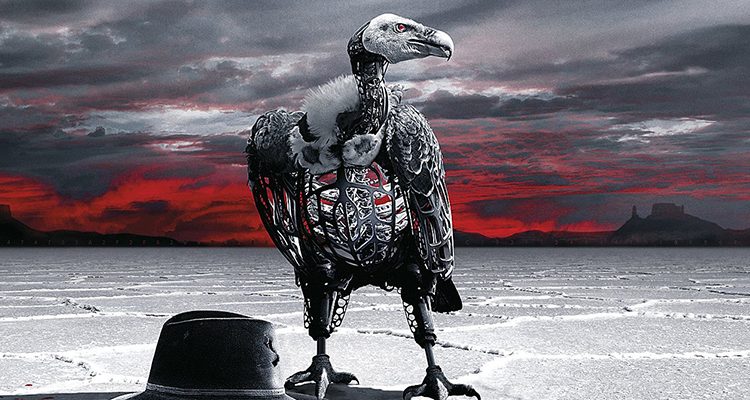
I’ve endeavored to keep this write-up spoiler-free because it is my hope that Lost in Space will draw more viewers in the run-up to the second season, which should be premiering soon on Netflix. I’ve included only starting points to certain plot threads, and my conclusions about the series are based on resolutions and tied-up loose ends.
How does Lost in Space work? This is a cheesy science fiction television show from 1965 that had no business being re-booted in 2019 for Netflix. Yet, it works. Even worse, the first season is an origin story arc. Yet, it works. The series does everything contemporary re-boots do. It’s “woke!” Yet, it works. Where the 1998 film uses flashy war and peace concepts to tell a melodramatic story with hyper-realized visual effects, the Netflix television adaptation brandishes an ecological framework against the backdrop of war with machines to justify escape from a planet ravaged by a meteor dubbed the “Christmas Star.” As a result of the extensive damage caused by the meteor, a plan is put in motion to ferry Earth’s best and brightest to Alpha Centauri. Television and motion pictures are obsessed with the idea of prequels and origin stories these days, and the show is well-planned for that purpose.
The schism between “old-school” fans and franchise “keepers” began with the new wave of Star Trek films, and then widened with the third wave of Star Wars films. Fans felt short-changed, insulted, and ultimately disappointed by the inclusion of new or “progressive” themes into their cherished franchises as well as flagrant inaccuracies in established canon, but when it’s done right, we have very little to complain about, don’t we? Lost in Space benefits from a casual indifference, less invested in the “old-school” mechanics of the show. It was a silly show that was never taken seriously and merely looked upon as “fun.” Fans didn’t care enough about the content of the 1965 television series to be wary of radical changes made for either the 1998 film or the 2018 series format. What I found impressive about this new incarnation of the show is that the characters were permitted to come together organically, and not through any contrived set of circumstances.

The first episode, “Impact,” plunges us right into the middle of the action before we’re sure what is happening, if only to remind us of how dangerous this mission really is. We get smatterings of story exposition before the mission begins which, we’re led to understand, is the result of a hasty plan to escape Earth. We also get the indication, right from the start, that Maureen Robinson (Molly Parker) is in charge of the mission with her estranged husband, John (Toby Stephens) assuming a subordinate posture, even if he doesn’t behave like a subordinate. Daughters Judy and Penny and son, Will, round out the crew. This is a family operation. Their ship, the Jupiter 2 crash lands in a tundra and becomes submerged in a lake of freezing water. Things become tense real fast when Judy is frozen in place under the surface while attempting to find emergency supplies.
In the final minutes of “Impact,” we’re introduced to June Harris, who steals the real Dr. Smith’s (Bill Mumy, in a quick cameo) identity before escaping the space station while it’s under attack, as well as Don West (Ignacio Serricchio) and his chicken, Debbie. Though the show was produced as a 10-episode committment for Netflix, “Impact” can be considered the pilot, and as such, it’s one of the best pilot episodes for a television series I’ve ever seen. The planet has as equally a diverse (and dangerous) ecosystem as Earth, which we begin to see in the next episode, “Diamonds in the Sky,” where Will (Maxwell Jenkins) makes inroads in communicating with the dangerous-looking robot (revealed to be part of an enemy force for reasons I won’t spoil) he encountered in “Impact.” The robot becomes Will’s guardian, protector, and friend. The planet is a death-trap, populated with incredible monsters, glass showers, unpredictable weather patterns, and cave creatures.

As families go, the Robinsons are not without problems. There’s an appalling lack of communication and built-up petty resentments between the siblings. some directed at their father for leaving, but most between the two sisters, Judy and Penny. Judy is Miss All American, perfect, brilliant, and beautiful. Penny is a bit of a wallflower misfit with a Cheshire cat-like grin. Where Judy is the perfect princess, Penny is rebellious and impulsive. All three of the kids are incredibly sharp (but never unrealistic); in any other situation, a testament to expert parenting. But here? They’re an accident waiting to happen. John and Maureen constantly snipe at each other. Add to their tension the unstable element of “Dr. Smith.” Her background is explored in “Infestation.” She incapacitates her sister (who was selected to go on the colony mission) and steals her credentials to get aboard the space station Resolute.
“Dr. Smith” escapes with opportunistic mechanic Don West. They crash on the planet. She ditches him and is rescued by the Robinsons. In “The Robinsons Were Here,” they seek out and are then joined by other survivors. This is when the reality of their situation begins to sink in. An injured survivor tells Judy the Resolute was attacked by fierce robot killing machines, among them Will’s robot. After finding downed wreckage of the space station’s audio transmitter, the colonists group together to build something that can reflect light up in the hopes of sending a signal. What’s refreshing are the little personality quirks and problems between the colonists. It’s nice to know people still won’t get along in a future where they search for a brave new world. “Dr. Smith” plots and schemes, manipulates everybody she comes into contact with, and spreads lies. She’s a much more frightening incarnation of the character than either Gary Oldman or Jonathan Harris, though she does share a strange sexual tension with Maureen.
The colonists have two major problems. The first problem is figuring out what to make of Will’s robot. The second problem is that Maureen has determined the planet will become uninhabitable in a short time because of the presence of a black hole hiding behind their sun. “This planet sucks,” Penny exclaims to her would-be boyfriend (Ajay Friese) when she discovers a swimming hole has dried up due to eroding soil. Evacuation becomes a priority, but how? Don West knows where they can find the necessary fuel for escape. He’s a regular Mad Max and a “bad-ass princess.” He also enjoys Van Halen. Penny’s would-be little boyfriend is the son of the Colony leader (Raza Jaffrey). He’s kind of a jerk, and I don’t know how he got elected because everybody claims to have not voted for him, which is interesting, but he is an effective leader and he brow-beats his cynics with all the aplomb of a stubborn commander-in-chief.

It’s the little things that make the first season of Lost in Space worthwhile. Subtle touches of humanity mixed with the jarring clashes of violence in a true, new frontier. There are reverses and set-backs and plans almost never work. Victory one second transmutes to failure the next. The planet paints shades of a familiar Earth, but with alien colors and ferocious monsters. The technology of the Jupiter Two is reminiscent enough of our technology in 2019, but with strokes of futurism. It isn’t all buttons, dials, and knobs and magic hyperspace travel. The show might have gleaming surfaces but underneath, all is jury-rigged. The visual effects are, of course, spectacular, but would we as consumers demand any less? More importantly, the visual effects and model work are integrated more firmly in the human interaction. There are working, practical effects and working vehicles. Believability is off-the-scale.
With the planet falling apart, the Robinsons and the other colonist have impetus to flee, to go back to the Resolute and attempt the planned sojourn to Alpha Centauri, which, they’ve reasoned, is habitable for human life. If anything, Lost in Space makes the case that imperfect humans cannot create the Perfect Society. Between all the side-deals, cavorting, scheming, and “Dr. Smith’s” machinations, it would be nothing short of a miracle to achieve that perfection they crave, though the colonists tend to forget it was a random meteor that caused their woes in the first place. Maureen and John reconcile, and the kids are closer than they’ve ever been, but it had to be because they were all trapped together during an apocalypse. This is not the show that was created by Irwin Allen in 1965. This is something altogether different and far superior. That’s not a rebuke of the original series or 1998 film. These shows are products of their times.

A large part of what makes this show work is Molly Parker. She is not the June Lockhart/Maureen Robinson of the 1965 series, a supposed biochemist relegated to planning meals and taking care of the children in a spaceship that looked more like a futuristic house than a powerful mode of conveyance. Parker’s Maureen is an independent, free-thinking individual, possessed of her own agency, and never waiting in line to be given orders. She’s not afraid to have vulnerabilities or failings. She’s a natural leader, and we believe her. That’s the most important component and the reason so many other similar performances falter. It’s difficult to get behind actors and productions and performances if we can’t identify with and understand these people. Too often writers seek to make their characters perfect to the point of a blinding arrogance that only serves to put up a wall between the audience and the actors. I can’t wait to see what happens in season two.




